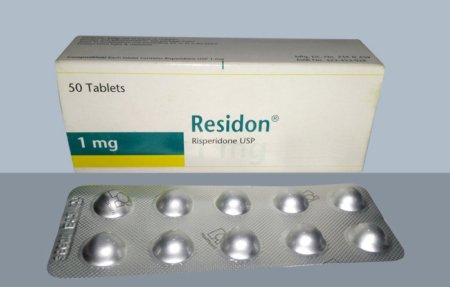
Type:10 Tablets
Generic Name:Risperidone
Manufacturer:Healthcare Pharmaceuticals Ltd.
Price:৳30.00
Acute and chronic psychoses, Mania, Schizophrenia, Bipolar disorder.
May be taken with or without food.
Oral Schizophrenia 2 mg/day initially; may be increased in increments of 1-2 mg/day at intervals >24 hours Recommended target dosage: 2-8 mg/day once daily or divided q12hr (efficacy follows bell-shaped curve; 4-8 mg/day more effective than 12-16 mg/day) Bipolar Mania 2-3 mg/day initially; may be increased if necessary in increments of 1 mg/day at intervals of 24 hours to 6 mg/day; dosage recommendations not available for treatment duration >3 weeks Tourette Syndrome 0.5-1 mg/day PO; may be increased or decreased in increments of 0.5 mg q12hr at intervals >3 days; not to exceed 6 mg/day Posttraumatic Stress Disorder 0.5-8 mg/day PO Elderly: Initially, 0.5 mg bid gradually increased in increments of 0.5 mg bid. Maintenance: 1-2 mg bid. Hepatic impairment: Initially, 0.5 mg bid, may increase in steps of 0.5 mg bid, up to 1-2 mg bid. Dose increments above 1.5 mg bid should be made at intervals of at least 1 wk.
Oral Schizophrenia <13 years: Safety and efficacy not established >13 years: 0.5 mg/day PO in morning or evening initially; may be increased in increments of 0.5-1 mg/day at intervals >24 hr to recommended dosage of 3 mg/day; dosage range: 1-6 mg/day (dosages >3 mg/day have not been proved more effective and are associated with increased incidence of adverse effects) If persistent somnolence occurs, daily dose may be divided q12hr Bipolar Mania <10 years: Safety and efficacy not established >10 years: 0.5 mg/day PO in morning or evening initially; may be increased in increments of 0.5-1 mg/day at intervals >24 hr to recommended dosage of 2.5 mg/day; dosage range: 0.5-6 mg/day (dosages >2.5 mg/day have not been proved more effective and are associated with increased incidence of adverse effects) If persistent somnolence occurs, daily dose may be divided q12hr Autism Irritability associated with autistic disorder in children aged 5-16 years <5 years: Safety and efficacy not established 5-16 years (<20 kg): 0.25 mg/day PO initially; may be increased after >4 days to recommended dosage of 0.5 mg/day 5-16 years (>20 kg): 0.5 mg/day PO initially; may be increased after >4 days to recommended dosage of 1 mg/day
Renal impairment: Initially, 0.5 mg bid, may increase in steps of 0.5 mg bid, up to 1-2 mg bid. Dose increments above 1.5 mg bid should be made at intervals of at least 1 wk.
Risperidone is contraindicated in patients with a known hypersensitivity to the product.
Risperidone is an atypical antipsychotic. Its activity is mediated through a combination of dopamine (D2) and serotonin (5-HT2) receptor antagonism. It also exhibits affinity to adrenergic (alpha1 and alpha2) and histamine (H1) receptors. It is less likely to cause extrapyramidal effects than conventional antipsychotics.
Preexisting CV diseases; discontinue use if signs and symptoms of tardive dyskinesia occur; renal and hepatic impairment, elderly, epilepsy; parkinsonism; pregnancy. May cause drowsiness and orthostatic hypotension. Gradual withdrawal is recommended. Monitor blood glucose in diabetics and patients at risk of developing diabetes. Lactation: Drug distributed in breast milk; do not nurse
>10% Somnolence (40-45%),Insomnia (26-30%),Agitation (20-25%),Anxiety (10-15%),Headache (10-15%),Rhinitis (10-15%),Fatigue (18-31%),Parkinsonism (28-62%),Akathisia (5-11%),Increased appetite (4-44%),Vomiting (10-20%),Drooling (<12%),Urinary incontinence (5-22%),Tremor (11-24%),Nasopharyngitis (4-19%),Rhinorrhea (4-12%),Enuresis (1-16%) 1-10% Constipation (5-10%),Dyspepsia (5-10%),Nausea (5-10%),Abdominal pain (1-5%),Aggressive reaction (1-5%),Facial edema (<4%),QT prolongation (<4%),Dizziness (1-5%),Extrapyramidal symptoms (EPS; 1-5%),Gynecomastia in children (1-5%),Rash (1-5%),Tachycardia (1-5%),Syncope (1-2%),Bradycardia (<4%),Palpitation (<4%),Chest pain (<4%),Agitation (<4%),Postural dizziness (<4%),Pruritus (<4%),Acne (1-2%),Hyperprolactinemia (<4%),Sexual dysfunction (<4%),Xerostomia (7-10%) <1% Agranulocytosis,Cholesterol increased,Delirium,Ketoacidosis,Orthostatic hypotension,Seizures Frequency Not Defined Diabetes mellitus,Hyperthermia,Hypoglycemia,Hypothermia,Myelosuppression,Neuroleptic malignant syndrome (NMS),Priapism,Prolonged QT interval,Tardive dyskinesia,Thrombotic thrombocytopenic purpura (TTP),Sleep apnea syndrome,Urinary retention Potentially Fatal: Neuroleptic malignant syndrome may occur rarely; seizures. May cause increased mortality in elderly with dementia-related psychosis.
May antagonise the effects of levodopa and dopamine agonists. May increase serum levels of clozapine when used together. Increased serum levels of carbamazepine when used concurrently. Carbamazepine may also decrease the serum levels of risperidone. Increased risk of neuroleptic malignant syndrome when used with indinavir and ritonavir. Potentially Fatal: Risperidone may enhance the hypotensive effect of certain antihypertensives.